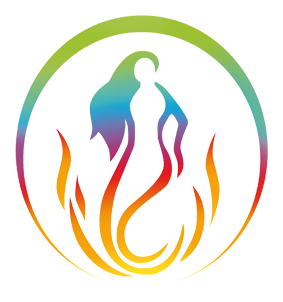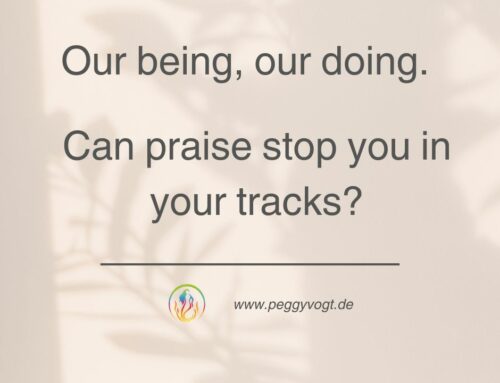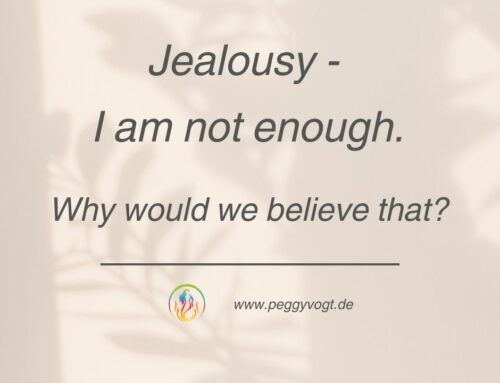Forgiving yourself. What do you think about that?
Have you even ever considered it?
Often we ask others to forgive us. When we have made a mistake that makes the other person’s life a little harder or just frustrates them. For example, you arrive at the airport and have forgotten your passport, cannot go on your planed trip right now. Those who wanted to travel with you can either set off on their own and wait for you somewhere far away, or rebook the flight with you at great expense.
On top, you may say something inappropriate, which you will regret later. In the end, all you want is having a good time, and in the best case scenario, you are asking the other person to forgive you.
Why is it important that you also forgive yourself in that process? Because what you did, for example forgetting something, and what you said, is not who you are at the core of your being. Because being angry at yourself when something does not go according to plan is part of being human. Because things happen, such as inappropriate language or the maybe even the right words in the wrong tone come out of your mouth.
What is more important though is that this moment of self-accusation and anger does not turn into an attitude towards yourself, hanging like a heavy stone around your neck, dragging you down for the rest of your life. It is more important to remember again that you love and accept yourself unconditionally as a human being. With all your faults. Mistakes can be made, but you ARE NOT the mistake. With all the emotions that come with it. Being annoyed, angry, sad, all of it is also part of being human. However, in the end there is love, self-love, accepting everything that you are and what makes you you.
But what about when you are on the other side, when you have been wronged?
When someone has verbally abused you? You caught someone gossiping behind your back about you?
The answer to that is not that obvious. In fact, a few years ago, when it was suggested to me that I better take responsibility for myself in such a situation and forgive not only the others, but myself, I did not understand anything. The others are screwing up and now I am supposed to work on myself? Are you kidding me?
So on top of my misery back at the time, what had happened to me was supposedly partly my fault. And that really upset me. After all, I had nothing to blame myself for. Well, not exactly.
Today, I would probably give this advice to anyone who comes to see me in my practice. On the one hand, it is important to distinguish between guilt and accepting personal responsibility. Guilt is a heavy concept that has had a long tradition in our culture and society. Our inner amount of unprocessed guilt for having done something wrong has grown steadily over the last two thousand years, so much that many people apologize for their very existence. But more about that in another article.
Things look different when it comes to responsibility. To take responsibility is not so self-evident, because it is constantly confused with guilt. The answer lies literally in the word itself – response-ability. What is meant by this is, among other things, how we deal with what has happened to us, what our response might be. Am I and will I remain a victim of the situation? Do I even make it my identity, being a victim?
Let us go back to the example of gossiping. Someone is saying things about you behind your back. For example, your relationship may have just fallen apart and someone who is not happy with themselves is bitching about it with their group of loyal followers, who you may have even been friends with yourself, that you were not capable – or broadly speaking, too dumb – to be in that relationship. Years later you will be glad that it is over and all turned out that way, but at that moment it is the last thing you need, and it makes you angry, speechless, sad.
Now, if someone in the same scenario had claimed that they saw you wearing a green winter coat the other day in the middle of a very hot Summer day, you might feel different. Because it is simply nonsense.
In the second case, you are absolutely sure it is not true and doubt the other person’s perception and mental state. In the first case, you are upset. Why? Because some unconscious part of you believes there might be something to it. So the other person has brought up something you unconsciously think or fear about yourself, you feel caught out, seen, exposed.
And that is the part that makes a very good starting point for self-forgiveness
- forgive yourself for having reacted in this way to what has been said
- forgive yourself for devaluing yourself over not having continued the relationship, for having failed
- forgive yourself for “needing” the gossiper to realize that you feel like a failure
- forgive yourself for not seeing the incredible learning potential the end of a relationship holds for you
- forgive yourself for giving up on yourself and not feeling capable of ever being in a relationship again
- forgive yourself for thinking / feeling you are not worthy of love….
The number of possibilities is as big as the different emotions and thoughts that move you in this situation and that do one thing above all – prevent you from living your life again, in joy and with new happiness, after a period of grieving and letting go.
That is what is most important to me when it comes self-forgiveness
To get out of the self-accusation loop, of feeling guilty and to get out of shame. To let go of the past with all the associated emotions that go with it, such as anger, resentment, sadness, low spirits, hopelessness, all of which keep you running around in circles.
Self-forgiveness will enable you to take away what is of true value: your growing life experience, some great wisdom, expanding your self-knowledge and the memory of all the beautiful moments you once shared and that the gossiper may only dream of.
Saying that, I cannot imagine my life without my forgiveness and self-forgiveness rituals.
Can YOU imagine doing the same for yourself?
Why?
Why not?
© Peggy Vogt 2023






Leave A Comment